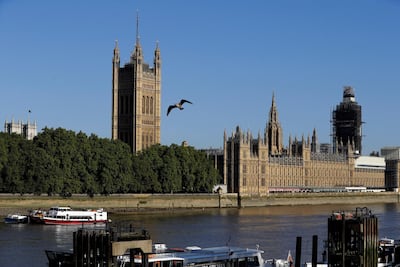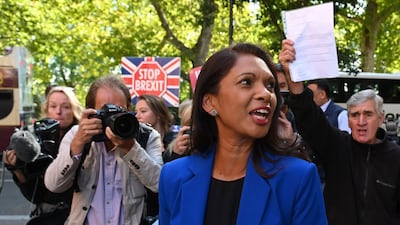As Britain’s opposition politicians scramble to mount a political response to prime minister Boris Johnson’s shock prorogation of parliament, at least three legal challenges have been mounted against the suspension.
In Scotland the beginning of a legal bid to block the government action, spearheaded by the pro-independence Scottish National Party (SNP), was heard at the Court of Session in Edinburgh, the country’s highest court on Thursday.
At the same time, lawyers for Remain legal activist and businesswoman Gina Miller have made an urgent application to the high court for judicial review of Boris Johnson’s plan to prorogue parliament.
In Northern Ireland a third legal challenge is ongoing. Victims’ rights campaigner Raymond McCord is seeking an injunction for the reversal of the prorogation on the grounds that it is a breach of the Good Friday agreement that formally ended the conflict in Northern Ireland.
Britain has been left reeling by Mr Johnson’s shock announcement on Wednesday that he would seek to suspend parliament for five weeks in September and October.
The decision has been criticised as, at least, a thinly veiled attempt to thwart British parliament’s legislative route to blocking a no-deal Brexit.
Mr Johnson’s government, by contrast, has said the prorogation, asked for legally and within constitutional boundaries, will allow it to meet its domestic responsibilities and still gives parliament ample time to debate Brexit.
The SNP’s Joanna Cherry is leading her party’s attempt to legally block the suspension of parliament.
Scotland’s highest civil court, the Court of Session in Edinburgh gave an approval for a full hearing of the SNP challenge fast tracking it for Thursday.
Following the hearing Ms Cherry said her legal team was seeking a interim interdict, which would stop the Prime Minister taking the option of suspension until a final decision has been made on the case.

Aidan O'Neill QC, representing the petitioners, said the prorogation was "unprecedented" and the petitioners are invoking the court's "constitutional jurisdiction."
The Scottish legal team arguing for the intervention against the government has highlighted footage of UK defence secretary Ben Wallace discussing the Brexit impasse. Writing on Twitter, Ms Cherry has said the footage shows “what we contend - that prorogation of Parliament is for an improper purpose and therefore unlawful”.
Scotland, which voted overwhelmingly in favour of remaining in the EU, has suffered different set of political traumas following the 2016 vote.
The first minister of the country's devolved government Nicola Sturgeon has written in Scotland's National newspaper that independence was now "inevitable" as a result of the prorogation.
Shock waves have also reverberated through the Scottish Conservative Party following the suspension parliament with the resignation of Ruth Davidson, the Tory leader north of the border. While Ms Davidson has said her departure was motivated by personal reasons, her resignation has also been seen through the lens of her previous run-ins with Mr Johnson.
In a statement shared on a website raising funds for her legal challenge, Ms Miller has called the prorogation a “cynical and cowardly action”.
“These actions are more akin to dictatorship than democracy and as such their legality must be tested in the courts,” the legal campaigner added.
Ms Miller, who rose to prominence spearheading a legal case challenging Theresa May’s government’s attempt to invoke article 50 without consulting parliament, has reassembled the same legal team that won the 2016 case before the Supreme Court. Her crowd funding site raising money for the legal battle has, thus far, raised £32,800 of a £150,000 goal.
In Northern Ireland, Mr McCord has said his judicial review, which pre-empted Mr Johnson’s request for a prorogation, of parliament is aimed at ensuring peace in the country is not jeopardised.
"This is important for both Remainers and Brexiteers; you can't have one person and his cabinet deciding to ignore the democratic system," he said outside court last week.
Meanwhile the government has said it is clear on the legal grounding for the prorogation, which was agreed to by the Queen on Wednesday.
“Lawyers are absolutely confident the courts cannot interfere with a bog standard Queen’s Speech process. No 10 has been extremely careful to do everything by the book in the normal way,” a Number 10 source told ITV’s Robert Peston.
“This process is ancient, so there is no scope for legislation [to stop it] or judicial review,” the source added.

